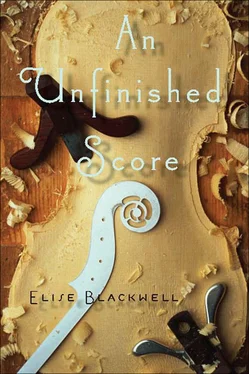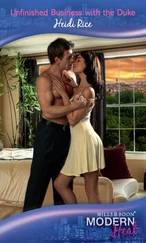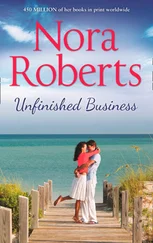There is nowhere to set her cup without first standing, so Suzanne holds it on its saucer, a feat that requires both hands, and tries to sip the coffee down quickly, although it is very hot and the cup is very thin. “Nothing yet. I left while he was out of town, but I’m going to tell him the truth.”
Olivia’s composure breaks just slightly, a subtle collapse of her chin and slight alarm in her cool gaze. “The truth?” she repeats.
“A version of it.” Suzanne wants to stop there but knows that Olivia has brought her here to get something from her. She hopes that the more she gives Olivia up front, the less she will take in the end. “I’m going to tell him that I’ve been asked to arrange a posthumous viola concerto by Alex Elling. He’ll ask why me, and that I will lie about.”
When Olivia leaves the room to get the score, Suzanne rises and sets her cup and saucer on a side table across the room. She lifts a throw pillow from the sofa, presses it to her face, breathes in fabric. No Alex . She turns to the small fireplace, its narrow mantel, and there, in a dark wood frame, is Alex’s son. She has feared this son, terrified that he will look like his father and crack her heart. This is only his picture, and already it is worse than she feared: he does not look like his father but rather an even blend of his father and mother. Half Alex and half Olivia — proof of their union, proof of Alex’s permanent connection with Olivia, who has his pillow case, his dirty shirts, his chair, his large house, his child.
Olivia, who has returned holding a large folder. “You didn’t know he was composing.”
Suzanne shakes her head as she turns. Olivia reestablishes herself on the sofa, trousers holding their perfect center crease, blouse fresh. She is not a woman who rumples, and again Suzanne feels unkempt. Slovenly, her father once called her mother, who was working too hard and succumbing to the flu. Once Petra called herself a salope . “You know,” Petra said, “French for sloppy. Even sounds like it.” But later Suzanne read the definition in a French dictionary: bitch, slut, whore . She tries to smooth her hair with her hands, hoping their oil will calm the frizz, wishing she had taken the time to put it up.
“Do you suppose he told you everything?” Olivia does not quite face Suzanne as she speaks, offering instead a three-quarter view.
“Most things, yes, I did think that.”
“ Did .” Olivia’s mouth pulls to one side, but the expression seems too sympathetic to be a smirk.
Suzanne presses a little harder; she wants to understand more than she wants to protect herself from this woman who certainly means her harm. “I don’t know why he would keep such a thing hidden from me.”
Olivia runs her hand up and down the envelope in her lap, just once in each direction, a tic almost under control. “Maybe he was embarrassed, insecure of the quality of his composition.”
“Alex wasn’t subject to self-doubt. He was one of the most assured men I have ever met.”
“Part of the attraction, I’m sure, but maybe he valued your opinion even more.”
There is some truth in this. It took a long while for Suzanne to overcome her belief that she wasn’t good enough for Alex, that he would leave her for someone more sophisticated, prettier, more talented, better bred. But finally she noticed that Alex depended as much on her as she depended on him. If she was critical or even neutral about a program he was considering he would grow agitated, or sometimes sullen, and later she would discover he had swapped pieces to win her approval. Once when he mused that he was going to start a program with Franck’s “The Accursed Huntsman,” Suzanne laughed and said, “Didn’t Franck’s students call him Pater Seraphicus?” The final program did not include the piece. And, more and more, particularly in the last year — the final year — Alex asked her opinion about questions of orchestration. How necessary is the brass strength? Heavier on the percussion? Can you hear the timpani? Would it work with strings only? She wondered sometimes if he was trying to push her to start composing, if despite his stated objections to composition he wanted her to do what she aspired to do. Now she wonders if he asked because he was the one beginning to write his own music.
Olivia watches her, raptor-like. “Or maybe you didn’t know him quite as well as you thought you did. Maybe you misread him.”
Yes , Suzanne thinks; she has spent her life getting everything wrong, not understanding what was right in front of her. She’s always felt like that: everyone else receives a graduation-from-childhood key to decipher human nature, but no one ever told her to get in line.
“Why didn’t you just send me the whole score?” Suzanne asks, returning to her chair, Alex’s chair. “Why make me come here?”
Olivia’s expression lowers. “I knew about you all along, you know, even your name, almost from the very beginning. I’ve heard your CD, seen your picture. Now you have to know who I am, what I look like.”
Suzanne remembers one of her early assignations with Alex, an orchestrated meeting in the improbable city of Cleveland. She thinks of Olivia home alone, or with the son, knowing where her husband was, why and with whom.
Olivia’s sideways smile returns, and now it looks as though it could be a smirk. “And we are just getting started.”
Since retreat does not seem open, Suzanne pushes forward. “Can I see more of the house?”
“Tomorrow, after my son leaves town and you come back. I do apologize about the hotel, but you should have waited until tomorrow, as I said. I would have paid the difference in flights. Money is nothing for me in this.”
Suzanne nods, though the idea of money being meaningless is not something she has ever understood. Maybe the closest she has come were those times with Alex, those times she said, Let’s get the real champagne or This meal is on me as though she were a person who could say such things all the time.
“And tomorrow, when you come back,” Olivia says, “I’ll show you his study. I’ll show you where he ate the breakfast I cooked for him every morning he was at home. I’ll show you our bedroom.” She says bedroom slightly more slowly than her other words and then pauses. “I imagine he told you we rarely slept together.”
The word rarely bites Suzanne. Never is what Alex told her. I haven’t slept with my wife in seven years, and I will never sleep with her again . She believed him, nearly completely, even as she knew it was the kind of lie people tell in situations like theirs, even though she could not say the same thing. Still she believes him, and she suspects that Olivia is trying to trip her up, to erode her faith in Alex. She is trying to inflict pain .
“It’s not a subject that came up. It was never about you.” Suzanne can feel the small square of her own chin, pointed straight to the ground instead of lifted as it is when she curves over her viola. It is pointing down so she will give away nothing. In her posture she holds her version of Alex away from his wife, holds it for herself.
“Really?” Olivia asks, gazing through the glass waves of the window as if, though surely not, she is disinterested. “Because for me it was always very much about me. A difference in perspectives, no?”
“We just didn’t talk much about other people, except for musicians.” Suzanne steps forward to take the envelope with Alex’s score, anxious to be alone with it, the one thing Alex may have left that is hers alone: music written by him for the instrument she plays.
People often call a musical score a piece of music, but of course it is only the two-dimensional representation of a complex experience. Yet unlike a photograph or a birth certificate, it is a representation that preserves not just a moment but the full music itself, protecting it intact through years of neglect or disinterest, making it possible at any moment, allowing it to be played centuries later. Cryogenics for songs and symphonies , Alex said once. Are not lost Verdi operas found and played? Do not university choirs perform chorales not heard by any ear since sung by medieval priests?
Читать дальше












